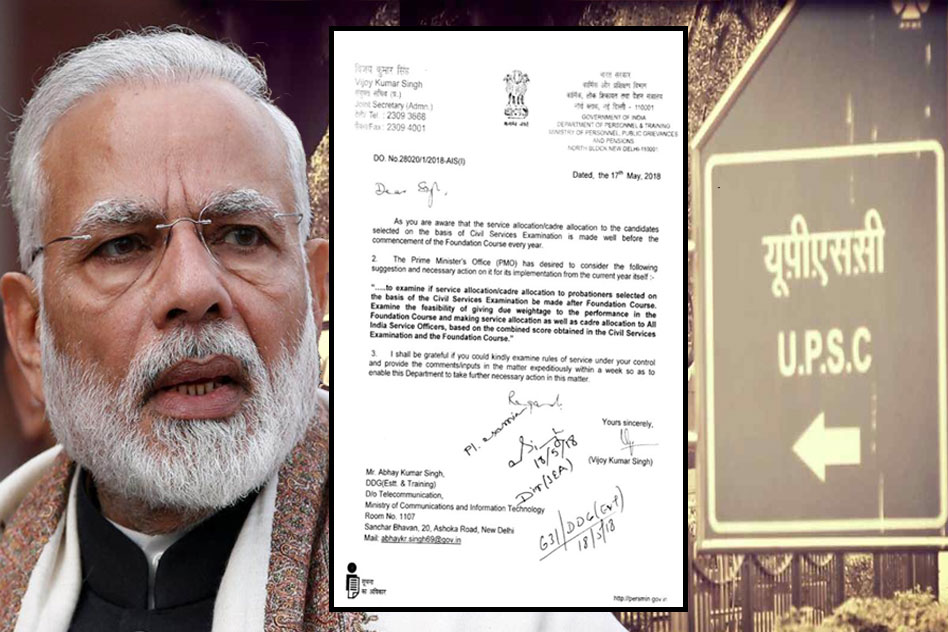
PMO Proposes Change In Cadre (State) & Service Allocation Process Of UPSC Candidates
23 May 2018 2:29 PM GMT
On May 17, a proposal by PMO was sent to ministries for suggestions and action. PMO’s proposal intends to add a fourth layer of scrutiny to the civil services examination process. UPSC, a constitutional body, is responsible for the selection of candidates based on merit and objectivity for India’s elite services including IAS, IPS, and IFS.
As of now, the exam is conducted in three stages, namely, prelims, mains and interview. Based on a candidate’s marks in mains and interview stages, cadre (state) and service allocation are done. Following which, the selected candidates are sent for the 3-4 month Foundation course.
As per PMO’s proposal, ministries and departments are supposed to “examine the feasibility of giving due weightage to the performance in the foundation course, and making service allocation as well as cadre allocation to all-India services officers based on the combined score obtained in the exam and the foundation course.”
The circular states, “The Prime Minister’s Office (PMO) has desired to consider the following suggestion and necessary action on it for implementation from the current year itself”.
This change would mean that the faculty in-charge of the foundation course will have a role in selecting which candidate gets assigned to which state and to which service. Even at first glance, this seems nothing but a way to bypass UPSC, a constitutional body.
Moreover, a candidate having done brilliantly in mains and in an interview can potentially be assigned to a less coveted service or state. Several people have pointed out that this can enable the government to cherry-pick candidates based on their ideological leanings. At the very least, this will end the camaraderie in the batch and turn a learning experience into a rat-race, and a lesson in obsequiousness.
This has generated a lot of criticism from serving officers, as well as from retired civil servants and aspiring candidates.
Shah Faesal, serving IAS officer and All-India-Rank 1 in 2009 civil services exam, points out in his excellent article published by The Print, that, “it will bring in subjectivity and discretion in this entire process because scores awarded by the training academy will now be on a par with those given by a constitutional body like the UPSC, although these scores wouldn’t add up at all.”
The foundation course used to be conducted only at Lal Bahudar Shastri National Academy of Administration, Mussoorie. With an increase in the number of seats, the foundation course is now being held in other places too, like HIPA, Gurgaon, and Mari Channa Reddy Academy, Hyderabad.
“How do we compare candidate assessment in one academy to that in another for the same exercise of service/cadre allocation? What if the training faculty falls for inter-personal biases, or becomes a victim of political interference, which most likely they will? The policy change that is intended to bring in a more ‘all-India’ perspective in the services will instead push them towards complete a loss of perspective, and further politicisation,” adds Shah Faesal
It is not yet clear if and how PMO’s proposed change will be integrated into the existing system. Even those who see this as a welcome step, are of the opinion that the government should proceed with caution.
Former Finance Minister ex-IAS officer, Yashwant Sinha, sees this as a “dangerous move.”
Changes in allocation of services and cadres after the foundation course is a dangerous move by the PMO and must be nipped in the bud.
— Yashwant Sinha (@YashwantSinha) May 22, 2018
Opposition leader Rahul Gandhi also tweeted his views on the matter.
Rise up students, your future is at risk! RSS wants what’s rightfully yours. The letter below reveals the PM’s plan to appoint officers of RSS’s choice into the Central Services, by manipulating the merit list using subjective criteria, instead of exam rankings. #ByeByeUPSC pic.twitter.com/VSElwErKqe
— Rahul Gandhi (@RahulGandhi) May 22, 2018
 All section
All section













